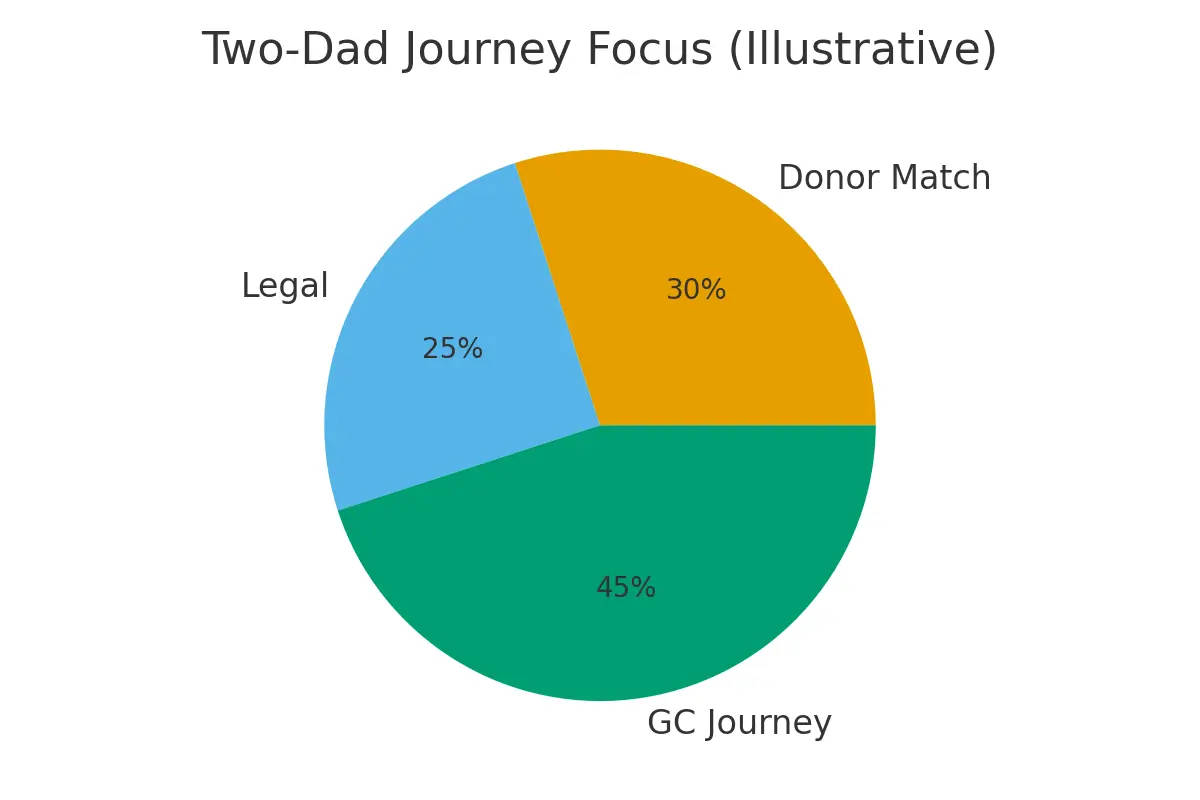
For many gay male couples, the dream of building a family can feel both exciting and overwhelming. The two-dad pathway using an egg donor and a gestational carrier is one of the most established routes. While the science and logistics behind it may sound complex, the big picture is simple: with the right donor, a skilled clinic, and a trusted carrier, two dads can welcome a healthy baby into their lives.
This article explains where this pathway fits, who it helps, what decisions really matter, and how to move forward with realistic expectations about time, costs, and outcomes.
What It Is
The egg donor + gestational carrier pathway means:
- Egg donor → provides the eggs.
- Sperm from one or both dads → fertilizes the eggs in the lab.
- Gestational carrier (GC) → carries the pregnancy but has no genetic link to the baby.
This differs from adoption or co-parenting because the child is genetically linked to one (or sometimes both, via embryo splitting) of the dads. The process requires IVF, legal contracts, and careful medical planning.
Who It Helps
This pathway is a strong fit for:
- Male couples or single intended fathers with no female partner to provide eggs or carry.
- Dads who want a biological connection to their child.
- Families who are prepared for the time, financial, and legal commitments.
It may not be the best fit if:
- Budgets are limited (since this is among the most costly family-building routes).
- Access to qualified gestational carriers is restricted in your country.
- Emotional readiness for a multi-step, multi-year journey is not yet there.
Step-by-Step Process
- Consultation & Labs – Fertility clinic runs initial bloodwork, semen analysis, and health screens.
- Choose an Egg Donor – Options include known donors, agency donors, or frozen donor eggs.
- Embryo Creation – IVF lab fertilizes eggs with sperm, then cultures embryos to the blastocyst stage.
- Genetic Testing (optional) – Preimplantation testing to screen for chromosomal issues.
- Select Gestational Carrier – Screening includes medical history, uterine imaging, and legal clearance.
- Legal Contracts – Intended parents and carrier sign agreements, ensuring parental rights and protections.
- Embryo Transfer – One embryo is placed into the GC’s uterus.
- Pregnancy & Delivery – Carrier receives prenatal care until birth, when the dads take custody of their baby.
Pros & Cons
Pros:
- Biological connection for one or both dads.
- Full parental rights secured before or shortly after birth.
- Professional oversight ensures medical and legal safety.
Cons:
- High cost (often $120,000–$200,000+ in the U.S.).
- Lengthy timelines (12–24 months from start to birth).
- Emotional stress due to reliance on multiple third parties.
- Legal complexities vary by country or state.
Costs & Logistics
Typical expenses include:
- Egg donor compensation + agency fees.
- IVF cycles, lab fees, and medications.
- Gestational carrier compensation + insurance.
- Legal contracts and escrow accounts.
- Travel and accommodation (if cross-border).
Budgeting tools and clinic calendar alignment help avoid “surprise bills.” Clear escrow management, insurance pre-authorizations, and pharmacy tracking can keep costs predictable.
What Improves Outcomes
- Donor screening standards → higher quality eggs, better embryo success.
- Lab quality indicators → reduce failed cycles.
- Uterine evaluation of the carrier → increases implantation odds.
- Protocol timing & calendar alignment → ensures embryo transfer occurs in optimal conditions.
- Mental health support → reduces stress, helps families stay resilient through setbacks.
- Case Study
A couple in their late 30s began with uncertainty: should they adopt or pursue surrogacy? After reviewing semen analysis and finances, they chose the egg donor + GC pathway. By working with a clinic that emphasized transparent budgets and early calendar planning, they avoided delays. Despite one failed transfer, steady communication with the carrier and clinic led to success on the second attempt. Two years after starting, they held their newborn son.
Mistakes to Avoid
- Skipping legal review – Always finalize contracts before embryo transfer.
- Choosing based on cost alone – The cheapest option often adds hidden risks.
- Rushing carrier selection – Screening quality is more important than speed.
- Underestimating timelines – Build patience into your plan.
- Not planning for twins – Decide early if you’ll transfer more than one embryo.
FAQs
Q. How long does the egg donor + gestational carrier process take?
Ans : On average, 12–24 months from first consultation to birth, depending on donor and carrier availability.
Q. Can both dads be biological parents?
Ans : Not in the same pregnancy, but some couples create embryos from both partners’ sperm and transfer them across different pregnancies or carriers.
Q. Is genetic testing of embryos required?
Ans : It’s optional but often recommended, especially if donor or intended father is older, to improve odds of a healthy pregnancy.
Q. What legal protections do we need?
Ans : A surrogacy attorney will draft contracts covering compensation, parental rights, medical decisions, and birth certificate details. Laws vary by state and country.
Q. What is the success rate?
Ans : Success depends on donor egg quality, sperm health, carrier screening, and clinic expertise. Many programs report cumulative live-birth rates above 70% after multiple transfers.
Ready to explore your path? Book a free 15-minute nurse consult, upload your labs for review, or request a personalized cost breakdown. The earlier you align calendars, labs, and legal steps, the smoother your family-building journey will be.
Related Links

Dr. Kulsoom Baloch
Dr. Kulsoom Baloch is a dedicated donor coordinator at Egg Donors, leveraging her extensive background in medicine and public health. She holds an MBBS from Ziauddin University, Pakistan, and an MPH from Hofstra University, New York. With three years of clinical experience at prominent hospitals in Karachi, Pakistan, Dr. Baloch has honed her skills in patient care and medical research.





